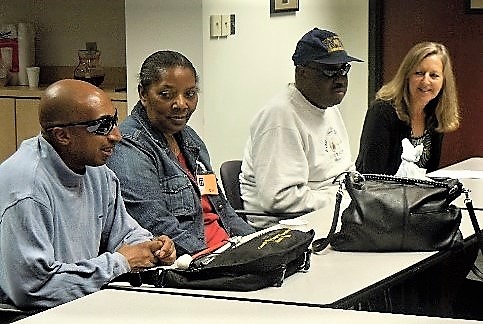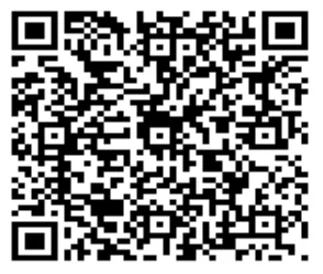Support Groups: Their Role in the Adjustment Process

If you are new to blindness or low vision, you may feel overwhelmed and need additional support. Participation in a support group may facilitate your adjustment to vision loss. Support groups bring people together who share a similar life challenge. Members learn to cope and feel less isolated as they connect with others who can relate to their situation. Friends and family members can also benefit from group attendance as they often need support. Members discuss their feelings, share experiences, and offer mutual support in a safe and confidential setting. They exchange ideas and information. The support group experience can help move members toward acceptance and adjustment to life with blindness or low vision.
Support groups are not the same as group therapy sessions. They may be peer-led by a layperson who is blind or low vision or someone interested in it, such as a family member. Sometimes, groups are offered through non-profit organizations, rehabilitation agencies, or organizations, and may be led by professionals like vision rehabilitation therapists, social workers, or nurses.
Some support groups are educational, while others emphasize emotional support. The format may include topical discussions, guest speakers, hands-on workshops, and product demonstrations. Participants learn about resources and services in their area. Group members share advice and strategies for living with blindness or low vision. A support group can be a great place to socialize and build friendships.
Benefits of Participating in a Support Group
- Feeling less lonely and isolated
- Gaining a sense of self-confidence and control
- Learning to cope in healthy ways and adjust to vision changes
- Talking openly and honestly about your feelings
- Managing stress, depression, or anxiety
- Developing an understanding of what to expect with your situation
- Getting practical advice and helpful information
- Discovering resources, services, and devices that meet your needs
- Having the chance to help and support others
- Receiving inspiration and motivation from others’ stories
- Setting goals and preparing for the future with hope
Things to Consider When Selecting a Support Group
- Is it geared toward a specific condition or age group?
- Is the location convenient? Is there transportation assistance?
- Who is the facilitator or moderator?
- Is it confidential and comfortable?
- Does it have established ground rules?
- What is a typical meeting like?
- Is it free, and if not, what are the fees?
- Does it meet your needs?
Getting the Most Out of a Support Group
The right group will help you feel supported and understood. Find one that fits you and is comfortable. At first, you may be nervous to share your personal experiences and feelings. But in time, participating and contributing to the group will be beneficial. Mutual respect, courtesy, and confidentiality among group members ensure a safe and supportive environment.
Find a Support Group
Many established organizations and peer networks already provide excellent opportunities for connection, information-sharing, and encouragement. Exploring these resources can give you ideas for structuring your group, introduce you to potential partners, or even connect you with an existing community that meets your needs. Below are some support groups and resources available to people who are blind or low vision and their families.
The American Council of the Blind (ACB)
The American Council of the Blind (ACB) lists helpful resources for people with blindness or low vision and their families. The website lists affiliates in each state and those for people with specific interests. Older people who are blind or have low vision may find information of interest through the ACB affiliate Alliance on Aging and Vision Loss (AAVL). Another special interest affiliate, the Council of Citizens with Low Vision International (CCLVI), focuses on individuals with low vision needs. Offerings include:
- support,
- resources,
- advocacy,
- education,
- Zoom calls,
- publications, and
- scholarships.
Front Porch
Covia Well Connected and Well Connected Espanol (now under the name Front Porch and formerly known as Senior Center Without Walls) offers:
- enrichment,
- community,
- fun,
- support and
- learning groups for older adults who may be homebound.
All groups meet virtually (offering telephone or online access). There is no cost to join or participate. They provide support groups specifically for people who are blind or low vision. Visit their website to check the catalog of offerings, or call 1-877-797-7299 to learn more or register.
Eye2Eye
Eye2Eye is a free phone-based peer support program offering:
- emotional support,
- assessment,
- information, and
- referrals to people who are blind or visually impaired and their families.
The program helps people cope with the challenges of adjusting to vision changes, using trained peer support specialists who are also blind or low vision. Support is also available in Spanish. Contact: (833) 932-3931 or email: [email protected].
ILVSG
ILVSG TeleSupport is a support group designed for older adults in the US with low vision who may not have access to the Internet or other in-person groups. The group meets monthly over the phone and has no fees or obligations. Learn more at MD Support — TeleSupport or call 1-888-866-6148 to get started.
Family Caregiver Alliance
The Family Caregiver Alliance (FCA) offers national, state, and local programs to support and sustain caregivers. An online family support group is also available.
Hadley Institute
Hadley offers workshops, such as learning how to make recreational activities accessible for people with blindness or low vision, and support groups. Call 800-323-4238 for help connecting to resources and online discussion groups.
MATHER
Mather is a not-for-profit organization dedicated to creating Ways to Age Well. They offer a variety of virtual programming. Many programs are free but require registration. Examples of programs include
- mindfulness and brain health,
- movement and dance, and
- chair yoga.
Foundation Fighting Blindness (FFB)
The Foundation Fighting Blindness has chapters nationwide providing education and connections to low vision resources.
National Federation of the Blind Seniors
The National Federation of the Blind Seniors Initiative is a learning peer support group. They reach out to seniors experiencing vision changes, empowering them to use their talents and abilities, learn effective strategies for living independently, and acquire a positive attitude about living with blindness or low vision.
National Alliance on Mental Illness
The National Alliance on Mental Illness provides support groups and a telephone hotline. Call 800-950-6264 Monday through Friday, 10 a.m. to 10 p.m.
Senior Center Without Walls
Several organizations offer this type of programming throughout the country. For example: Senior Centers Without Walls | Neighborhood and Community Services (fairfaxcounty.gov) and Senior Center Without Walls | Sowega Council on Aging (sowegacoa.org).
Social Call (a Front Porch Program)
Social Call is a Front Porch program connecting adults 60 and older to new friends on the phone or video calls. Volunteers are “matched” to participants to build friendships through weekly calls. This free service is a great way to socialize and connect when you can’t get out in your community. To get started, visit the Social Call website or call 1-877-797-7299. Front Porch also offers a home matching program in the California Bay area for individuals who want to share housing.
Vanderbilt Visually Empowered Individuals Support Group
Provided by VanderbiltHealth.com, this support group meets virtually on Microsoft Teams or by phone monthly from 6:30 to 8 p.m. Eastern. Anyone is welcome to join. Call (615) 322–5000, register online, or scan the QR code to sign up:

Vision Exchange
Vision Exchange is an online resource for support group leaders facilitating support groups for adults with blindness or low vision. The purpose is to exchange ideas, information, and community resources to help adults with blindness or low vision remain independent.
Starting a Group
When no group is available with which you are comfortable, the next option is to start a group. Learn how you can start a group by reading Starting a Support Group for People with Vision Loss – ConnectCenter.
Finally, meeting with others and learning how they overcome the daily challenges associated with significant vision changes can better prepare you for those challenges. Join a support group so you do not have to “go it” alone.
Contributed by Audrey Demmitt, R.N., VisionAware Support Group Advisor